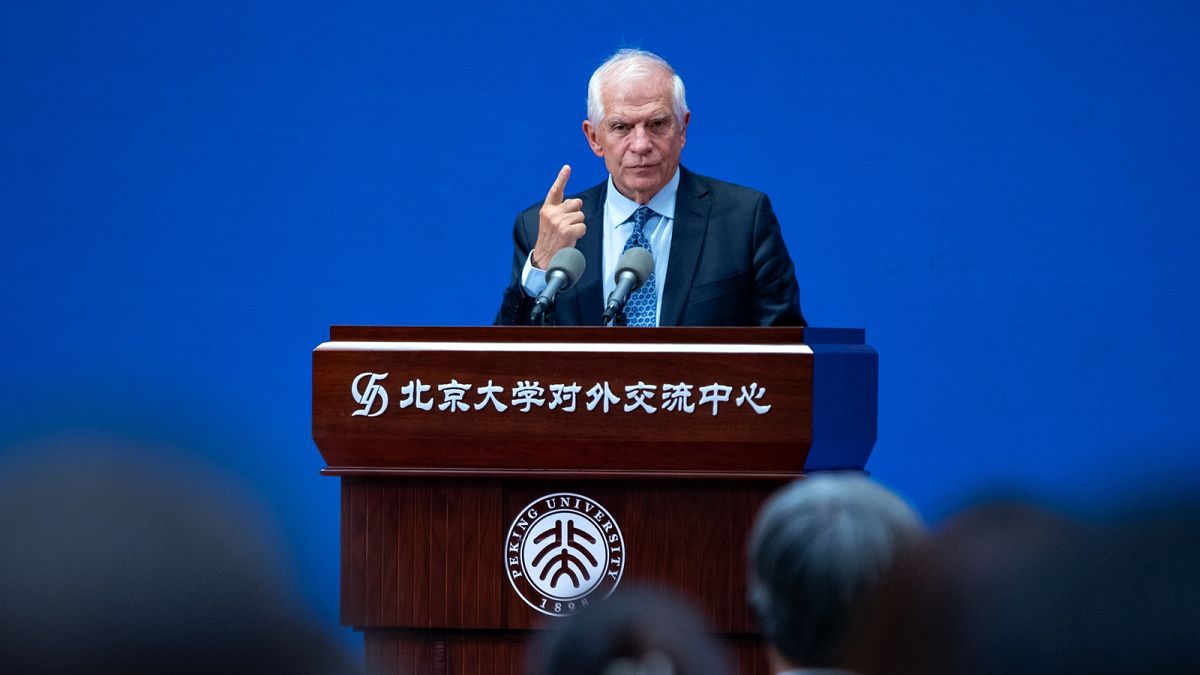The multilateral system "cannot be based on cherry-picking" regardless of how it is reformed, Josep Borrell said during his three-day visit to China.
"The world in which we live is multipolar, but it requires regulation. We need to agree on the basic common principles," the European Union's foreign policy chief said on Friday in a wide-ranging speech delivered at Peking University, in Beijing.
"The real problem in our world today is that multipolarity has increased, but multilateralism has decreased. There are more players in the world game, but there are less rules," he went on. "Multilateralism is in crisis."
Borrell acknowledged a "peaceful rivalry" between the EU and China over their divergent interpretation of human rights but insisted that "universal values go beyond the values of each individual country. They are bigger."
He then made a direct appeal to prevent "the right of the stronger" from reshaping the world order, as Russia is attempting to achieve through its large-scale war on Ukraine.
"We have to build rules. The rules precisely exist to protect the small against the big, the less wealthy against the rich," Borrell said. "We try to abide by the rules, living by multilateralism, which cannot be based on cherry-picking."
"Accepting the rules of the WTO (World Trade Organization) but not those of the United Nations Convention of the Law of the Sea. We cannot choose the law that we want to fulfil. The system has to be fulfilled completely. This system is indivisible," he added.
The EU, together with its G7 allies, has long accused China of pursuing a highly selective interpretation of international law. For example, by, on the one hand, strongly defending the principle of national sovereignty and non-interference in domestic affairs while, on the other, waging disinformation campaigns across democratic societies and imposing measures of economic coercion against its critics.
The Chinese equidistant stance in the Ukraine war has also been denounced as a biased application of international law, namely the prohibition of acquiring territory by force.
"We consider essential that China makes a major effort to convince the people of Ukraine that China is not Russia's ally in this war," Borrell said.
China has struck back by making similar accusations about the West, criticising, for instance, the multiple rounds of sanctions slapped on Russia as a strategy of "maximum pressure" and "long-arm jurisdiction." Beijing also resents the EU's new "de-risking" strategy to reduce vulnerable dependencies, claiming it is a disguised form of protectionism incompatible with WTO rules and being dictated by Washington.
"Our relation is of global significance. It is not swayed by third countries and should not be subject to third-party influence," Chinese Foreign Minister Wang Yi said on Friday. "We're able and capable to have high-quality dialogue and cooperation on the basis of mutual respect (...) and build a new paradigm under which civilisations interact."
Borrell's pointed reference to the UN Convention of the Law of the Sea appeared to invoke Beijing's territorial claims in the South China Sea, which are frontally opposed by its neighbouring countries, like the Philippines, Vietnam and Malaysia.
The long-running dispute, which involves a large number of islands, reefs and banks, has been the source of persistent strain and has, at times, raised fears of a wider regional confrontation that could drastically upend global commerce.
The EU has adopted a neutral position on the conflict and urges parties to refrain from unilateral actions that might "endanger peace, security and stability."
Another issue in the South China Sea that preoccupies Europeans is the tensions in the Taiwan Strait, which are expected to ratchet up in anticipation of the self-ruling island's January presidential election. China has vowed to reunite Taiwan with the mainland, a goal that has led to rampant speculation about a ground invasion in the future.
During his speech, Borrell repeated the EU's three-noes approach: no to recognition of Taiwan, no to provocations on any side, and no to the use of force to alter the status quo.
"We have bilateral ties with Taiwan, which don't imply at all any kind of political recognition as an independent country. We will not do it," the diplomat said.
"We have to resolve the tensions through meaningful and open dialogue, keeping channels of communication to prevent misunderstandings and to de-escalate tensions."
